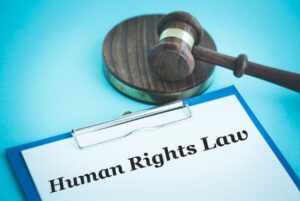By Julie Alarcón, Esq.
As many of you know, New York state and city have laws banning discrimination, including employment discrimination, within their geographic boundaries. On March 14, 2024, in a unanimous decision, the Court of Appeals held that New York state and city Human Rights Laws each protect nonresidents who are not yet employed in the city or state but who proactively seek an actual city- or state-based job opportunity.
In Syeed v. Bloomberg L.P. (N.Y., Mar. 14, 2024) 2024 N.Y. Slip Op. 01330, plaintiff Nafeesa Syeed (“Plaintiff”), a South Asian woman, asserted employment discrimination claims against her former employer, Bloomberg L.P (“Bloomberg”). Plaintiff claimed that while working in Bloomberg’s Washington D.C. bureau, Bloomberg denied her promotions for which she was well-qualified, paid her less than her male counterparts, and regularly subjected her to derogatory conduct and remarks targeting her race and gender.
In 2018, while still working in Washington D.C., Plaintiff applied for various positions in Bloomberg’s New York bureau. One of the positions to which Plaintiff applied, United Nations (U.N.) reporter, was filled by a man who allegedly had less practical experience than Plaintiff and less formal education. According to Plaintiff, the managing editor in Washington D.C. told Plaintiff that Bloomberg had decided not to convert the U.N. position to a “diversity slot.” Plaintiff understood the manager’s comment to mean that while “diversity slot” positions might be filled by women or people of color, non- “diversity slot” positions would effectively be filled only by white men.
In 2020, Plaintiff commenced a class action lawsuit in New York state court alleging, in pertinent part, that Bloomberg discriminated against her on the basis of sex and race by denying her promotions in violation of Title VII, New York State Human Rights Law (NYSHRL), and New York City Human Rights Law (NYCHRL).
After Bloomberg removed the case to federal court, the United States District Court for the Southern District of New York granted Bloomberg’s motion to dismiss all of Plaintiff’s claims under both NYSHRL and NYCHRL. Relying on New York state law, the District Court held that Plaintiff could not show that Bloomberg’s conduct impacted her in New York state or city. The Court held that New York Human Rights Laws were limited to people who live or work in New York, and Plaintiff did not allege either. Plaintiff appealed to the United States Court of Appeals, Second Circuit.
The Second Circuit reserved its decision on Plaintiff’s appeal and certified the following question to New York’s highest state court: “Whether a nonresident plaintiff not yet employed in New York City or State satisfies the impact requirement of the New York City Human Rights Law or the New York State Human Rights Law if the plaintiff pleads and later proves that an employer deprived the plaintiff of a New York City- or State based job opportunity on discriminatory grounds.” The Second Circuit explained that “‘certain portions of [Hoffman v Parade Publications (2010)15 N.Y. 3d 285] seem to imply that nonresidents can satisfy the . . . impact requirement [of the state’s and city’s human rights laws] only if they currently work in New York City or State’ [but] left open the possibility that its impact test might be satisfied by ‘those who would work in New York City or State…’”
In response, the New York Court of Appeals held the state’s and city’s human rights laws apply to nonresidents because “[t]he prospective employee personally feels the impact of a discriminatory refusal to promote or hire in New York City or State, because that is where the person wished to work (and perhaps relocate) and where they were denied the chance to do so.” The Court stated when applying the liberal construction of “inhabitants” and “individual within this state” under the respective Human Rights Law, “a prospective inhabitant or employee, who was denied a job opportunity because of discriminatory conduct, fits comfortably within the Human Rights Laws’ protection.”
The Court explained in addition to the targeted individual, discrimination harms the state and city as governmental institutions, since they “are deprived of economic and civic contributions from individuals discriminatorily denied the opportunity to work in New York, along with the more diverse workforces and communities that the individuals would advance.” The Court further explained that its decision had “the beneficial effect of protecting New York institutions and the general welfare of the state and city—as the legislature and city council intended” since discrimination harms not just the targeted individual, but also the state and city as governmental institutions, which are “deprived of economic and civic contributions from individuals discriminatorily denied the opportunity to work in New York, along with the more diverse workforces and communities that the individuals would advance.”
Based on this decision, New York employers should be aware that the scope of individuals protected by the NYSHRL and NYCHRL has expanded, and should consult counsel for advice on navigating these matters.
Please contact an NFC team member if you have any questions or seek further assistance.

